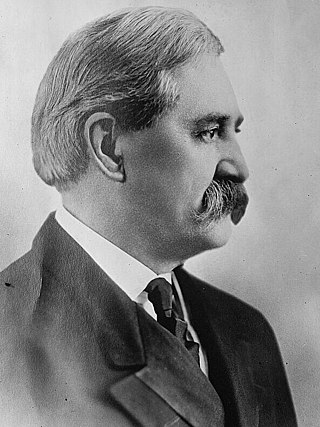
Daniel Frederic Steck, was the only Iowa Democrat in the United States Senate between the American Civil War and the Great Depression. He was sworn in as senator only after an extraordinary election challenge, in which his apparent defeat at the polls by a Progressive Party ally running as a Republican was reversed by a Republican-controlled U.S. Senate over seventeen months later.

Smith Wildman Brookhart, was twice elected as a Republican to represent Iowa in the United States Senate. He was considered an "insurgent" within the Republican Party. His criticisms of the Harding and the Coolidge administrations and of business interests alienated others in the Republican caucus and led to his ouster from the Senate over an election challenge.

Albert Baird Cummins was an American lawyer and politician. He was the 18th governor of Iowa, elected to three consecutive terms and U.S. Senator for Iowa, serving for 18 years. Cummins was a leader of the Progressive movement in Washington and Iowa. He fought to break up monopolies. Cummins' successes included establishing the direct primary to allow voters to select candidates instead of bosses; outlawing free railroad passes for politicians; imposing a two-cent street railway maximum fare; and abolishing corporate campaign contributions. He tried, with less success, to lower the high protective tariff in Washington.

William Squire Kenyon was a United States senator from Iowa, and a United States circuit judge of the United States Court of Appeals for the Eighth Circuit.

Clyde LaVerne Herring, an American Democratic politician who served as the 26th governor of Iowa, and then one of its U.S. senators, during the last part of the Great Depression and the first part of World War II.

Charles Augustus Rawson was an unelected United States Senator from Iowa for nine months in 1922.

Lester Jesse Dickinson was a Republican United States Representative and Senator from Iowa. He was, in the words of Time magazine, "a big, friendly, white-thatched Iowa lawyer." In early 1936, he dreamed of winning the presidency. However, the only race he would enter that year would be for his own seat in the Senate which he lost.

Burton Erwin Sweet was a four-term Republican U.S. Representative from Iowa's 3rd congressional district, then a wide but short chain of counties in north-central and northeastern Iowa, in the shape of a monkey wrench.

Charles Edgar Pickett was a two-term Republican U.S. Representative from Iowa's 3rd congressional district.

Claude Rodman Porter was an American politician and lawyer. He served in both chambers of the Iowa General Assembly and as a United States Attorney, and was a perennial Democratic Party runner-up to Republican victors in three races for governor of Iowa and six races for U.S. senator. In an era in which the Republican Party was so dominant in Iowa that Senator Jonathan P. Dolliver remarked that "Iowa will go Democratic when Hell goes Methodist," Porter twice came closer to winning the governorship than all but one other Democratic candidate of that era. He later served as a member of the U.S. Interstate Commerce Commission for eighteen years.

The 1932 United States Senate election in Iowa took place on November 8, 1932. Incumbent Republican Senator Smith Brookhart, a controversial progressive figure within the conservative Iowa Republican Party, was defeated in the June Republican primary by Henry A. Field. Field was in turn defeated in the general election by Democrat Louis Murphy. Brookhart also entered the general election as the candidate of the Progressive Party but finished a distant third.

The 1924 United States Senate election in Iowa took place on November 4, 1924. Incumbent Republican Senator Smith W. Brookhart ran for re-election to a full term in office against Democrat Daniel F. Steck.

The 1942 United States Senate election in Iowa took place on November 3, 1942. Incumbent Democratic Senator Clyde Herring ran for re-election to a second term but was defeated by Republican Governor George A. Wilson.

The 1918 United States Senate election in Iowa took place on November 5, 1918. Incumbent Republican Senator William S. Kenyon was re-elected to a second term in office over Democrat Charles Rollin Keyes.

The 1936 United States Senate election in Iowa took place on November 3, 1936. Incumbent Republican Senator Lester J. Dickinson ran for re-election to a second term but was defeated by Democratic Governor Clyde Herring.

The 1962 United States Senate election in Iowa took place on November 6, 1962. Incumbent Republican Senator Bourke B. Hickenlooper was re-elected to a fourth term in office over Democrat E.B. Smith.

The 1966 United States Senate election in Iowa took place on November 8, 1966. Incumbent Republican Senator Jack Miller was re-elected to a second term in office over Democrat E.B. Smith.

The 1972 United States Senate election in Iowa took place on November 7, 1972. Incumbent Republican U.S. Senator Jack Miller ran for re-election to a third term but was defeated by Democrat Dick Clark. Iowa was one of fifteen states alongside Alabama, Arkansas, Colorado, Delaware, Georgia, Louisiana, Maine, Minnesota, Mississippi, Montana, New Hampshire, Rhode Island, South Dakota and West Virginia that were won by Republican president Richard Nixon in 1972 that elected Democrats to the United States Senate.

The 1926 United States Senate election in Iowa was held on November 2, 1926, alongside a concurrent special election to the same seat.






















